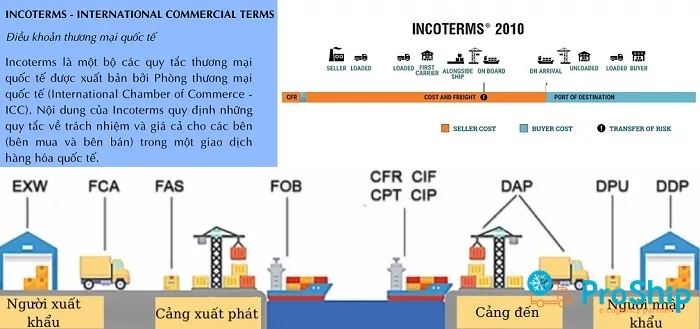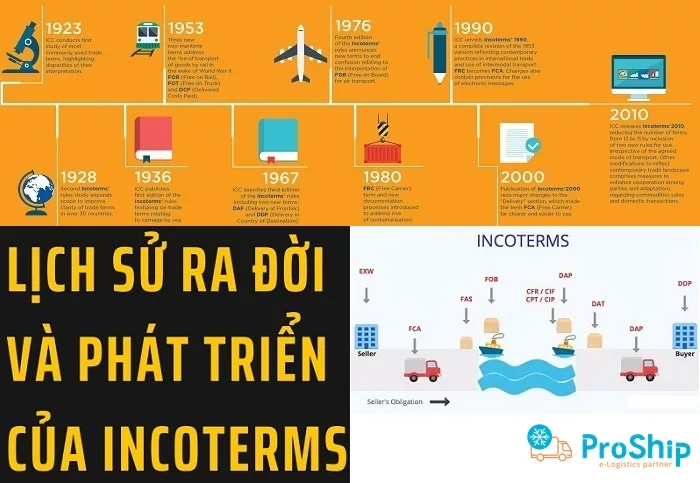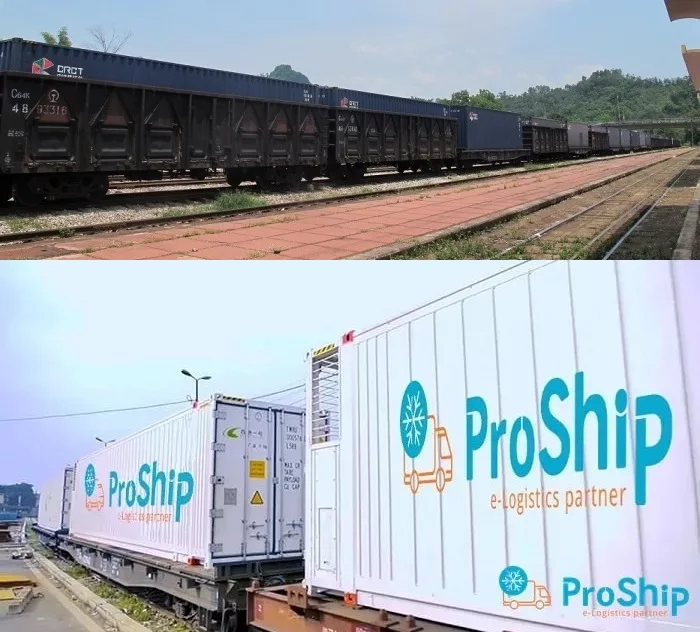x Các DN cần tìm hiểu lịch sử hình thành, vai trò của incoterms trong kinh doanh xuất nhập khẩu?
x Bạn muốn biết incoterms có ý nghĩa quan trọng thế nào trong hoạt động xuất khẩu, nhập khẩu?
x Doanh nghiệp có nhu cầu xuất khẩu hàng đi Quốc tế, cần tìm nơi gửi hàng tốt nhất, uy tín nhất?
Incoterms là viết tắt của cụm từ “International Commercial Terms” hay còn được gọi là Điều khoản Thương mại Quốc tế. Proship.vn sẽ cập nhật những kiến thức liên quan tới incoterms nhằm giải đáp thắc mắc Incoterms là gì? Lịch sử hình thành incoterms trải qua các giai đoạn nào? Incoterms có ý nghĩa, vai trò thế nào đối với hoạt động kinh doanh XNK hiện nay. Và qua đây cũng gợi ý một địa chỉ gửi hàng XK đi Quốc tế, Châu Âu tốt đáng tin cậy nhất cho quý DN.
📦 Hotline Liên Hệ Vận Chuyển
🧭 Miền Trung
XEM THÊM: Dịch vụ vận chuyển Container Lạnh giá rẻ
Incoterms là gì? Quy tắc của Incoterms là gì?
Khái niệm Incoterms
Incoterms (viết tắt của “International Commercial Terms”) là một bộ các quy tắc giải thích các điều kiện thương mại phản ánh thực tiễn nghĩa vụ giao nhận hàng hóa giữa các bên mua và bán trong các hợp đồng mua bán hàng hóa. Incoterms tương ứng chặt chẽ với Công ước Liên hợp quốc về Hợp đồng Mua bán Hàng hóa Quốc tế. Incoterms được tất cả các quốc gia thương mại lớn biết đến và thực hiện.
Incoterms chỉ là một phần của toàn bộ Hợp đồng xuất khẩu. Trong Incoterms không nói bất cứ điều gì về giá trị hàng hóa, khi nào thanh toán sẽ được thực hiện hoặc phương thức thanh toán sẽ được sử dụng trong giao dịch và Incoterm cũng không thay thế cho bất kỳ luật của quốc gia nào.
* Ví dụ thực tế về dẫn chiếu Incoterms vào hợp đồng: Công ty A ở Mỹ và Công ty B ở Việt Nam đã ký kết hợp đồng bán hàng với điều khoản FOB Incoterms 2020. Hợp đồng nêu rõ, hàng hóa được giao cho người vận chuyển tại cảng Xuân Thủy, Hải Phòng vào ngày 20 tháng 3 năm 2023 sẽ dẫn chiếu điều khoản này vào hợp đồng như sau: [FOB – Cảng Xuân Thủy, Hải Phòng – Incoterms 2020].

Quy tắc chung của Incoterms
Incoterms có nhiều điều kiện khác nhau, được xây dựng trên nguyên tắc tăng dần nghĩa vụ của người bán trong quá trình giao hàng, vận chuyển, chi phí, rủi ro,…để các bên lựa chọn. Cụ thể, các quy tắc Incoterms đó là:
- Trách nhiệm: Ai làm gì? Ví dụ, ai thu xếp vận chuyển hoặc bảo hiểm hàng hóa hoặc ai lấy chứng từ gửi hàng và giấy phép xuất khẩu hoặc nhập khẩu;
- Rủi ro: Người bán hàng “giao hàng” ở đầu và khi nào, hay nói cách khác, rủi ro chuyển từ người bán sang người mua đâu và khi nào;
- Chi phí: Bên nào phải trả các chi phí, ví dụ như chi phí vận chuyển, bảo hiểm, đóng gói bao bì, bốc hàng hoặc dỡ hàng, và kiểm tra hoặc chi phí liên quan đến kiểm tra an ninh.
NÊN ĐỌC: Dịch vụ vận chuyển Container Bắc Nam giá rẻ
Lịch sử hình thành, vai trò Incoterms và lý do phải có Incoterms phiên bản mới
Sau đây, Proship sẽ trình bày về lịch sử hình thành incoterms, vai trò của incoterms trong hoạt động xuất, nhập khẩu cũng như lý do phải có incoterms phiên bản mới. Cụ thể:
Lịch sử hình thành và phát triển của Incoterms
Lịch sử hình thành incoterms được tóm lược một cách dễ hiểu như sau:
- Năm 1923: ICC bắt đầu nghiên cứu về điều kiện thương mại (commercial trade terms)
Một trong những nhiệm vụ đầu tiên của ICC, sau khi ra đời vào năm 1919, là thúc đẩy thương mại quốc tế, muốn vậy phải hiểu được các điều kiện thương mại mà các thương nhân đang dùng. Việc này đã được thực hiên thông qua một nghiên cứu 6 điều kiên thương mại thông dụng nhất ở 13 nước. Kết quả nghiên cứu đã được công bố vào năm 1923, trong đó nhấn mạnh sự khác biệt, không thống nhất về giải thích các điều kiện thương mại.
- Năm 1928: Rõ ràng, trong sáng hơn
Để xem xét những khác biệt về giải thích đã được xác định trong nghiên cứu trước, ICC đã triển khai một nghiên cứu thứ hai. Lần này nghiên cứu đã mở rộng ra việc giải thích các điều kiện thương mại được sử dụng tại trên 30 nước.
- Năm 1936: Hướng dẫn cho doanh nhân toàn cầu
Dựa trên kết quả nghiên cứu, phiên bản đầu tiên của Incoterms do ICC phát hành (có ký hiệu R trong vòng tròn – ®) đã ra đời. Các điều kiện Incoterms 1936 bao gồm FAS, FOB, C&F, CIF, Ex Ship và Ex Quay.
- Năm 1953: Vận tải hàng hóa bằng đường sắt
Do ảnh hưởng của Chiến tranh Thế giới lần thứ II nên phiên bản bổ sung của Incoterms phải dừng lại cho đến đầu những năm 1950. Đến năm 1953, phiên bản đầu tiên của Incoterms mới được phát hành lại. Ba điều kiện mới được bổ sung dành cho vận tải không phải bằng đường biển, đó là DCP, FOR và FOT.
- Năm 1967: Chỉnh sửa việc giải thích sai
ICC phát hành phiên bản thứ ba của Incoterms nói về việc giải thích sai của phiên bản trước đó. Hai điều kiện mới được bổ sung là DAF và DDP.
- Năm 1976: Tiến bộ trong vận tải hàng không
Vận tải hàng hóa bằng đường hàng không tăng lên là nguyên nhân của việc bổ sung thêm một điều kiện mới của Incoterms là FOB Airport.
- Năm 1980: Sự tăng lên nhanh chóng của vận tải container
Sự phát triển mạnh mẽ của vận tải hàng hóa bằng container cùng với quá trình xử lý chứng từ mới dẫn đến sự cần thiết phải bổ sung Incoterms. Phiên bản mới đã bổ sung thêm điều kiện FRC (Free Carier), quy định cho trường hợp hàng hóa được giao tại một địa điểm ở trên bờ, chẳng hạn là CY (Container Yard) chứ không phải là lan can tàu.
- Năm 1990: Sửa đổi hoàn chỉnh
Phiên bản thứ 5 của Incoterms đã đơn giản hóa điều kiện Free Carier bằng cách bỏ hết các điều kiện liên quan đến từng phương thức vận tải cụ thể, như FOR, FOT, FOB Air Port. Tất cả các điều kiện trên có thể thay thế bằng điều kiện FCA (Free Carier … at named point: giao hàng cho người chuyên chở tại địa điểm chỉ định).
- Năm 2000: Sửa đổi nghĩa vụ thông quan
Mục “giấy phép, ủy quyền và thủ tục” trong điều kiện FAS và DEQ đã được sửa đổi để phù hợp với thực tiễn thông quan phổ biến nhất.
- Năm 2010: Phản ánh tính hiện đại của thương mại quốc tế
Incoterms® 2010 gộp các điều kiện D, bỏ các điều kiện DAF, DES, DEQ, DDU và thêm các điều kiện DAT và DAP. Ngoài ra, thêm nghĩa vụ của người bán và người mua trong việc hợp tác chia sẻ thông tin và những thay đổi để thực hiện việc bán hàng nhiều lần trong hành trình (string sales).
- Năm 2020:
Đây là phiên bản mới nhất, có hiệu lực từ 01/01/2020 với 11 quy tắc: EXW (giao tại xưởng), FCA (giao cho người chuyên chở), FAS ( giao dọc mạn tàu), FOB( giao hàng trên tàu). CPT (cước phí trả tới), CFR (tiền hàng và cước phí), CIP (cước phí và bảo hiểm trả tới), CIF (tiền hàng, bảo hiểm và cước phí), DAP (giao tại địa điểm), DPU (giao tại địa điểm đã dở xuống), DDP (giao đã trả thuế).

=> Như vậy, có thể thấy từ khi ra xuất bản lần đầu tiên cho đến nay, Incoterms có 9 phiên bản chính thức gồm: Incoterms 1936, Incoterms 1953, Incoterms Incoterms 1967, Incoterms 1976, Incoterms 1980, Incoterms 1990, Incoterms 2000, Incoterms 2010, Incoterms 2020.
Cần nói thêm, Incoterms không đề cập tới các vấn đề sau:
- Quy cách, phẩm chất của hàng hóa;
- Chuyển quyền sở hữu về hàng hóa;
- Bồi thường do vi phạm hợp đồng mua bán;
- Thời gian, địa điểm, phương thức và đồng tiền thanh toán;
- Hậu quả của chậm trễ hoặc vi phạm trong việc thực hiện các nghĩa vụ của hợp đồng;
- Giảm nghĩa vụ hoặc miễn trách nhiệm khi xẩy ra những sự cố không mong muốn hoặc không nhìn thấy trước;
- Cấm vận, quyền sở hữu trí tuệ, nơi và phương pháp giải quyết tranh chấp…;
- Tăng thuế, cấm xuất nhập khẩu,…
Vai trò của Incoterms
Trong giao dịch hàng hóa quốc tế, Incoterms có 5 vai trò quan trọng dưới đây:
- Được xem là ngôn ngữ quốc tế trong vận tải và giao nhận hàng hóa ngoại thương;
- Incoterms là bộ quy tắc giúp hệ thống hóa các tập quán thương mại quốc tế, sử dụng phổ biến khắp thế giới;
- Là cơ sở vô cùng quan trọng để doanh nghiệp xác định giá cả mua bán hàng hóa;
- Là căn cứ pháp lý quan trọng để giải quyết tranh chấp, thực hiện khiếu nại nếu có phát sinh giữa người bán và người mua trong suốt quá trình thực hiện hợp đồng ngoại thương;
- Là phương tiện giúp đẩy nhanh tốc độ đàm phán, soạn thảo hợp đồng ngoại thương, tổ chức và thực hiện hợp đồng.
Lý do phải có Incoterms phiên bản mới
Với phiên bản lần thứ 8 (Incoterms® 2010), Incoterms của ICC đã trở thành một quy tắc chuẩn mực được thừa nhận và chấp nhận trên toàn cầu. Incoterms cũng được sử dụng rộng rãi trong các hợp đồng mua bán quốc tế và nội địa trên toàn thế giới và trở thành “sách gối đầu giường” của thương nhân trong giao dịch thương mại quốc tế và nội địa.
Kỷ niệm 100 năm ngày ra đời của ICC và nhằm đáp ứng yêu cầu của thực tiễn thương mại quốc tế trong thời đại công nghệ số, ICC đã tổ chức soạn thảo, sửa đổi, bổ sung và phát hành phiên bản mới Incoterms® 2020. Incoterms® 2020 được soạn thảo bởi một Nhóm chuyên gia, chủ yếu đến từ Châu Âu, trong đó lần đầu tiên có đại diện của Trung Quốc và Úc. Nhóm đã họp định kỳ để thảo luận các vấn đề được nêu ra từ 150 nước là thành viên của ICC. Trong quá trình soạn thảo, nhóm đã đề xuất một số sửa đổi, bổ sung nhằm mục đích đưa ra một bộ quy tắc Incoterms đơn giản, dễ hiểu, rõ ràng, đúng đắn và chính xác, phản ánh thực tiễn sinh động của thương mại quốc tế.
Proship cần nhấn mạnh rằng, Incoterms không thể thay thế cho tất cả các điều kiện và điều khoản cần phải có trong một hợp đồng mua bán, do đó các vấn đề nêu trên phải được giải quyết bằng những quy định trong hợp đồng và luật điều chỉnh hợp đồng đó. Incoterms luôn luôn và chủ yếu được áp dụng trong ngoại thương, nên có tên gọì là các điều kiện thương mại quốc tế. Tuy nhiên, cũng có thể áp dụng ỉncoterms trong các hợp đồng mua bán hàng hoá nội địa. Trong trường hợp Incoterms được sử dụng như vậy, các điều kiện về giấy phép và lảm thủ tục xuất nhập khẩu trở nên không cần thiết.
📦 Hotline Liên Hệ Vận Chuyển
🧭 Miền Trung
Trong kinh doanh xuất nhập khẩu, Incoterms có ý nghĩa thế nào?
Việc sử dụng Incoterms trong kinh doanh xuất nhập khẩu có nhiều ý nghĩa quan trọng, bao gồm:
- Đảm bảo sự hiểu biết và thống nhất giữa các bên: Việc sử dụng các điều khoản chuẩn trong Incoterms giúp đảm bảo rằng các bên tham gia giao dịch đều hiểu rõ và đồng ý với các trách nhiệm và nghĩa vụ trong quá trình vận tải hàng hóa;
- Tăng tính cạnh tranh và hiệu quả kinh doanh: Việc sử dụng Incoterms giúp tăng tính cạnh tranh và hiệu quả kinh doanh trong lĩnh vực xuất nhập khẩu, vì các bên có thể thực hiện các giao dịch vận chuyển hàng hóa một cách hiệu quả và đáp ứng được yêu cầu của khách hàng;
- Giảm thiểu tranh chấp và rủi ro: Việc sử dụng Incoterms giúp giảm thiểu sự tranh chấp và rủi ro trong quá trình vận chuyển hàng hóa, vì các điều khoản được xác định rõ ràng và chi tiết về trách nhiệm và chi phí phát sinh cho từng bên.
=> Tóm lại, việc sử dụng Incoterms trong kinh doanh XNK rất quan trọng để đảm bảo sự hiểu biết và thống nhất giữa các bên, giảm thiểu rủi ro, tranh chấp và tăng tính cạnh tranh, hiệu quả kinh doanh trong lĩnh vực xuất nhập khẩu.
>>Xem thêm: Phân loại Container chở hàng
Proship Logistics nhận vận tải, XK hàng khô/lạnh Chuyên tuyến Việt Nam – Trung Quốc – Mông Cổ – Kazakhstan – Nga – Châu Âu bằng đường sắt liên vận Quốc tế Nhanh an toàn, Giá rẻ cạnh tranh
CÔNG TY CỔ PHẦN PROSHIP chuyên cung cấp Dịch vụ xuất khẩu hàng hóa, vận chuyển container khô/lạnh đường sắt Chuyên tuyến Việt Nam – Trung Quốc – Mông Cổ – Kazakhstan – Nga – Châu Âu với cước phí DV rẻ cạnh tranh, hàng gửi đi giao thương đảm bảo an toàn tuyệt đối. Hàng hóa được sắp xếp trong các toa xe mui kín, container khô, lạnh (40 HC, 45 HC-RF) thuận lợi cho hoạt động lưu trữ, xếp dỡ và vận chuyển. Ga tác nghiệp hiện tại là Ga Sóng Thần, Ga Đông Anh, Ga Yên Viên, Ga Kép Bắc Giang, Ga Đồng Đăng,…có thể đáp ứng tối đa nhu cầu gửi hàng đi xuất khẩu của quý DN.
Bên cạnh vận chuyển Hàng nguyên container (FCL), Hàng lẻ (LCL), Hàng thương mại điện tử (E – commerce), Hàng thực phẩm, trái cây bằng RF container – Proship Logistics còn hỗ trợ về các vấn đề liên quan tới đơn vị còn nhận hỗ trợ khai báo hải quan, Dịch vụ XNK ủy thác, Dịch vụ kho bãi,…Bảng giá các dịch vụ liên quan cho các tuyến gửi hàng liên vận sẽ được niêm yết công khai và cam kết hạn chế phát sinh chi phí trong quá trình vận chuyển từ Ga – Ga, Ga – Kho, Kho – Kho.
ĐẶC BIỆT, đối với các mặt hàng nông sản, thủy hải sản, trái cây vận chuyển bằng container lạnh tự hành đường sắt, Proship đã và đang ứng dụng giải pháp vận chuyển giảm 25 – 30% chi phí Logistics trong chuỗi cung ứng lạnh của DN. Riêng đối với tuyến vận chuyển Sầu riêng, Vải thiều sang Trung Quốc còn hỗ trợ đóng thuế 2 đầu bao trọn gói thủ tục thông quan, kiểm dịch.

Đối tượng khách hàng Proship hướng tới
Các đối tượng khách hàng mà Proship tập trung hướng tới:
- Đại lý giao nhận hàng Forwarding;
- Đơn vị nhập hàng;
- Đơn vị cung cấp hàng.
Các mặt hàng nhận xuất khẩu bằng container đường sắt
Dưới đây là các mặt hàng nhận vận tải, xuất khẩu chuyên tuyến của Proship:
- Hàng nông sản: Gạo, lúa mì, bột mì, sữa, động vật sống, cà phê, hồ tiêu, hạt điều, chè, rau quả tươi,…;
- Hàng công nghiệp: Dệt may; Giày dép; Đồ gỗ; Valy, túi xách, ô dù; Điện thoại các loại và linh kiện; Máy vi tính, sản phẩm điện tử và linh kiện; Máy ảnh, máy quay phim và linh kiện; Phương tiện vận tải và phụ tùng; Máy móc, thiết bị, dụng cụ phụ tùng khác; Dây điện, cáp điện; Nguyên phụ liệu dệt may, da giày; Nhựa và sản phẩm nhựa; Phân bón; Hóa chất,…;
- Hàng tiêu dùng được vận chuyển trong thị trường nội địa và xuất khẩu sang Trung Quốc, Nga, Mông Cổ, Kazakhstan, Châu Âu và ngược lại…
Lịch tàu hàng container đường sắt Quốc tế Proship
Thông tin lịch tàu hàng đường sắt Liên vận Quốc tế
* Việt Nam – Trung Quốc: Khởi hành hằng ngày
- Tuyến Yên Viên – Đồng Đăng – Pingxiang – Nanning Nan sau đó tiếp chuyển đi các tỉnh, thành phố của Trung Quốc (và ngược lại);
- Thời gian: 3 ngày (không bao gồm thời gian làm thủ tục tại các ga biên giới.
* Việt Nam – Trung Á: Khởi hành Chủ nhật hàng tuần
- Tuyến Yên Viên – Đồng Đăng – Pingxiang – Alashankou – Dostyk – Almaty/Astana – sau đó tiếp chuyển đi Uzbekistan, Tajikistan, Kyzgyzstan;
- Thời gian: 18 ngày (không bao gồm thời gian làm thủ tục tại các ga biên giới).
* Việt Nam – Nga: Khởi hành thứ 4 và Chủ nhật hàng tuần
- Tuyến Yên Viên – Đồng Đăng – Pingxiang – Manzhouli – Zabaykalsk – Vorsino (Moscow);
- Thời gian: 23 ngày (không bao gồm thời gian làm thủ tục tại các ga biên giới).
* Việt Nam – EU: Khởi hành thứ 4 và Chủ nhật hàng tuần
- Tuyến Việt Nam – Trung Quốc – Kazakhstan – Russia – Belarus – Poland (Malaszewicze) – Germany (Duisburg/Hamburg);
- Thời gian: 28 – 30 ngày (không bao gồm thời gian làm thủ tục tại các ga biên giới).
Thông tin lịch tàu hàng đường sắt từ Ga Kép
* Từ ga Kép có thể kết nối được với 4 hướng đường sắt:
1. Kép – Đồng Đăng – Bằng Tường (Trung Quốc);
2. Kép – Lưu Xá (Thái Nguyên);
3. Kép – Hạ Long (Cảng Cái Lân);
4. Kép – Yên Viên (Hà Nội).
* Lịch trình cụ thể như sau:
- Vận chuyển hàng hóa Liên vận Quốc tế trên tuyến Kép – Đồng Đăng – Bằng Tường – Nam Ninh và ngược lại: Mỗi ngày 2 chuyến hàng;
- Vận chuyển hàng hóa Nội địa trên tuyến Kép – Yên Viên – Đà Nẵng – Sóng Thần và ngược lại: Mỗi ngày 1 chuyến hàng;
- Dịch vụ vận chuyển hàng hóa khép kín Kho – Kho.
Proship Logistics đưa ra các cam kết với khách gửi hàng
Cam kết của Proship đối với các Doanh nghiệp, Chủ hàng:
- Giá cước vận chuyển đường sắt liên vận Quốc tế ổn định, cạnh tranh;
- Thời gian vận chuyển nhanh, an toàn, lịch chạy tàu cố định;
- Vận chuyển khối lượng lớn và đa dạng các loại hàng hóa;
- Thủ tục hải quan thuận tiện, khai báo một lần từ điểm xuất phát đến điểm kết thúc;
- Theo dõi lịch trình hàng hóa online trên toàn tuyến đường vận chuyển;
- Khả năng kết nối với các điểm đến nằm sâu trong nội địa xa hệ thống cảng biển.
Qua những kiến thức hữu ích mà Proship Logistics đã chia sẻ trên đây, các DN xuất nhập khẩu nếu cần tìm hiểu về lịch sử hình thành incoterms cũng như vai trò của incoterms trong kinh doanh nên lưu lại thông tin nhằm phục vụ hiệu quả cho công việc…Và khi Quý khách hàng có nhu cầu vận chuyển container đường sắt liên vận Quốc tế Chuyên tuyến Việt Nam – Trung Quốc – Mông Cổ – Kazakhstan – Nga – Châu Âu nhanh an toàn giá rẻ, vui lòng liên hệ ngay 0909 344 247 để được tư vấn giải pháp vận tải tối ưu, tiết kiệm, hiệu quả nhất.
📦 Hotline Liên Hệ Vận Chuyển
🧭 Miền Trung

